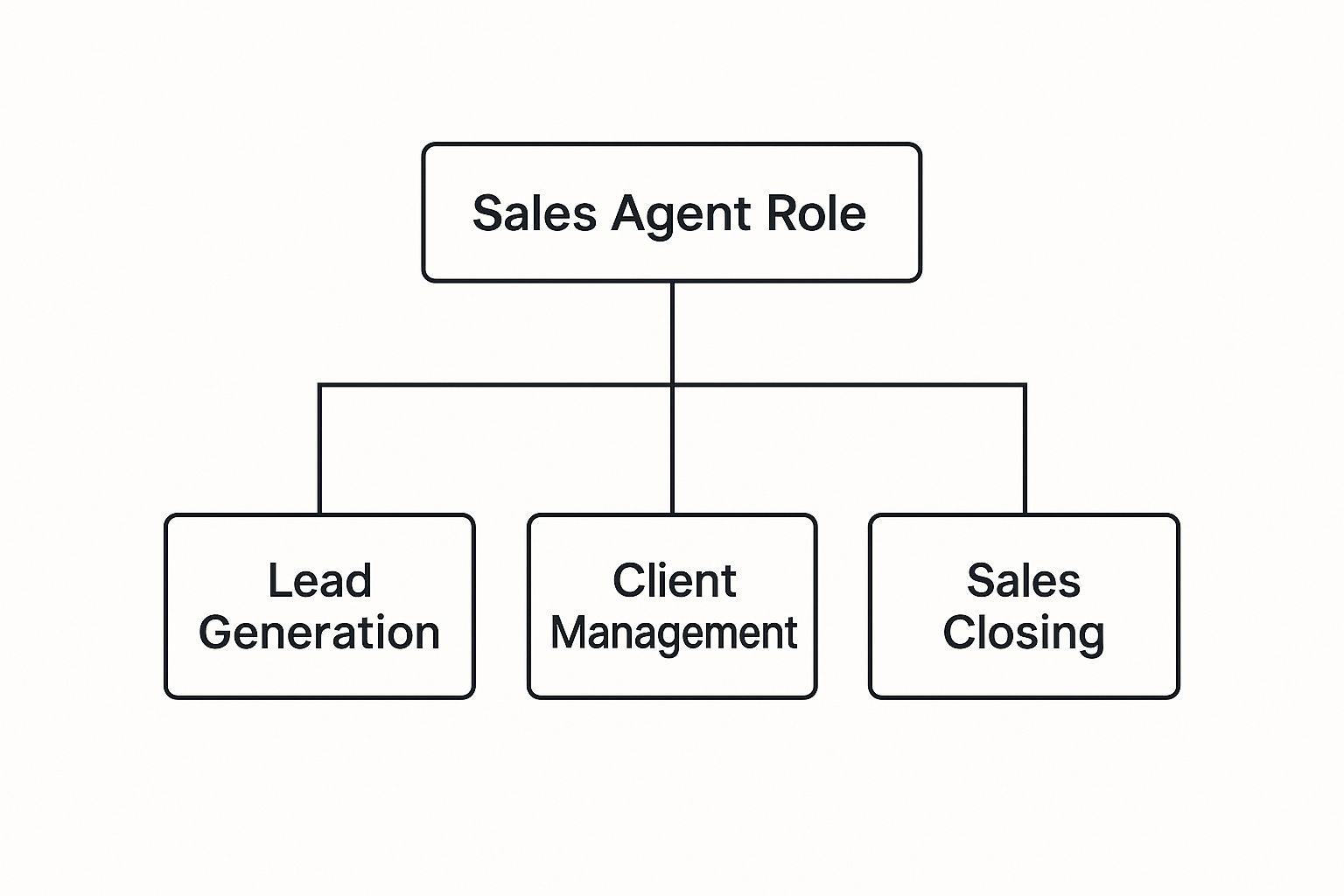At its heart, a sales agent's job boils down to three core functions: generating qualified leads, nurturing client relationships, and, of course, closing sales. This requires a dynamic mix of prospecting, demonstrating value, skilled negotiation, and dedicated account management, all working together to drive revenue and keep customers happy.
What a Modern Sales Agent Actually Does
If you're picturing a slick, fast-talking product pusher from a bygone era, it's time for an update. Today's sales agent is much more of a strategic partner and a problem-solver. The role has fundamentally shifted from purely transactional selling to building consultative relationships. It's no longer about just selling a product; it's about providing a genuine solution to a client's real-world problems.
This evolution means their day-to-day duties are more varied than ever. For example, a critical skill isn't just delivering a rehearsed pitch, but mastering sales objections with a blend of empathy and deep product knowledge. A truly successful agent is an exceptional communicator, an even better listener, and an analytical thinker who can draw a straight line from a customer's pain point to their company's solution.
The image below gives you a bird's-eye view of the sales agent's world, breaking down the key duties and responsibilities we're about to explore.

This visual neatly organizes the role into its three main pillars: finding new opportunities, managing relationships, and securing business. As we get into the details of each, you'll see how these pillars are interconnected and support one another.
The Modern Sales Agent Role at a Glance
Before we unpack everything, here’s a quick snapshot of what it takes to be a sales agent today. This table summarizes the key duties, the skills needed to perform them, and the tools that make it all happen.
| Core Duty | Essential Skill | Common Tool/Platform |
|---|---|---|
| Prospecting & Lead Generation | Active Listening | CRM (e.g., Salesforce, HubSpot) |
| Client Relationship Management | Negotiation | Communication (e.g., Cloud Move) |
| Market Analysis & Reporting | Time Management | Analytics Dashboards |
| Closing Sales Deals | Problem-Solving | Video Conferencing (e.g., Zoom) |
This gives you a solid foundation for understanding the modern components of the job.
A sales agent's success is no longer measured solely by closed deals, but by the strength of the relationships they build and the value they deliver over the entire customer lifecycle. This long-term perspective is what separates good agents from great ones.
Fueling the Pipeline with Prospecting and Lead Generation

Before a single deal can be closed, you need a potential customer. This simple truth makes prospecting and lead generation one of the most fundamental sales agent duties and responsibilities. It’s the engine that keeps the entire sales process moving.
Think of it this way: a healthy pipeline is the lifeblood of any sales team. It ensures a steady, reliable flow of potential deals. This isn’t about just making random calls, though. It’s a strategic effort to identify ideal customer profiles, research target markets, and truly understand industry pain points. The real goal is to build a list of qualified leads—people and businesses who genuinely need what you're selling.
Identifying and Qualifying Leads
So, where do you start looking? The best agents cast a wide net, using a variety of channels to find potential customers who match their ideal profile. This multi-channel approach is key to connecting with the right people at the right time.
Some of the most effective prospecting activities include:
- Social Selling: Today’s sales professionals live on professional networks. In fact, mastering LinkedIn prospecting is a non-negotiable skill for uncovering high-quality leads that others miss.
- Cold Outreach: The name might sound a bit old-fashioned, but modern outbound calling is all about providing value from the very first conversation, not just launching into a hard sell. You can learn more about effective strategies here: https://cloud-call-center.ae/2025/07/29/outbound-calling/
- Networking: Attending industry events—both virtual and in-person—and building genuine connections can reveal opportunities you'd never find through a screen.
- Following Up on Inbound Leads: When marketing delivers a lead from a website form or campaign, speed is everything. A quick, effective response is crucial for turning that initial spark of interest into a real conversation.
Navigating Challenging Markets
This ability to generate leads becomes absolutely critical in tough economic times. Take the retail market in the Middle East, which saw a 22.5% decline between 2019 and 2024. In that environment, it was the skilled sales agents who kept their companies afloat. They adapted their outreach, embraced new digital tools, and found pockets of opportunity in a shrinking market.
Qualifying a lead is about confirming a genuine need. It's the process of transforming a simple "contact" into a "prospect"—someone with a recognised problem that your product or service can solve, the authority to make a purchase, and a clear budget.
At the end of the day, prospecting isn't a one-off task; it's a daily discipline. By consistently dedicating time to finding and qualifying new leads, a sales agent builds a robust pipeline that can weather market shifts and drive steady revenue growth.
Building Lasting Client Relationships

Getting that first sale is a huge win, but it's really just the beginning of the story. One of the most important sales agent duties and responsibilities is to nurture that initial transaction into a strong, long-term partnership. This is the critical pivot from simply acquiring customers to retaining them, which is the secret sauce for sustainable growth and turning happy clients into your best marketers.
Managing these relationships isn’t about ticking off a few post-sale follow-up boxes. It's a proactive, continuous effort that requires consistent communication, hands-on support, and a real stake in your client's success. When you consistently provide value long after the contract is signed, you stop being just another vendor and become a trusted advisor. That deep connection is what lays the groundwork for all future business.
From Vendor to Trusted Partner
The ultimate goal is to become an essential resource for your client's business. To do that, you have to stay one step ahead—anticipating their needs, offering sharp advice, and solving problems before they even bubble to the surface. It’s all about showing them you’re committed to their long-term vision, not just your quarterly numbers.
Making this shift from vendor to partner involves a few key habits:
- Regular Check-ins: Don't wait for them to call you. Schedule routine calls or meetings to see how things are going, tackle any new challenges, and share useful industry trends.
- Proactive Support: Did a new feature just roll out that could make their life easier? Let them know. Being proactive shows you're thinking about their business.
- Gathering Feedback: Actively ask for their thoughts on your product and their experience. This input is gold, helping you improve everything you do.
This kind of engagement keeps you relevant and constantly proves the value of your partnership. It also helps build a solid customer experience management framework where client satisfaction is always the priority.
A loyal customer isn’t just someone who buys again. They’re a powerful source of referrals, glowing testimonials, and honest market feedback. The time you put into building that relationship pays you back in ways a single sale never could.
Managing Accounts and Driving Growth
When you have a strong relationship built on trust, growth opportunities just naturally appear. Clients are far more open to hearing about new services or upgrades when the suggestion comes from a trusted advisor instead of a pushy salesperson. It makes upselling and cross-selling feel less like a pitch and more like helpful advice.
Of course, great account management relies on great record-keeping. Using a CRM to log every call, email, and meeting is non-negotiable. This data helps you personalize every conversation, track their changing needs, and spot trends that can guide your strategy. By mastering this, a sales agent doesn’t just keep customers—they grow them into bigger, more valuable accounts year after year.
Combining Market Analysis with Product Expertise

Great sales agents don’t just memorize product features and call it a day. They become students of their entire industry. This is where a salesperson evolves into a genuine consultant, moving beyond reciting a script to offering valuable advice that solves real-world problems.
This isn’t a one-and-done task; it’s a commitment to continuous learning. Top performers are constantly asking the right questions: What are my competitors up to? What new headaches are my clients dealing with? Where are the hidden opportunities we haven't tapped into yet? Finding the answers is a core part of their job.
Becoming an Industry Authority
To be a true consultant, a sales agent has to build a knowledge base that extends far beyond their own product catalog. It means taking the initiative to gather and make sense of market intelligence.
This process breaks down into a few key activities:
- Competitor Analysis: Regularly checking out what competitors are offering, how they're pricing it, and what their marketing looks like. This helps you pinpoint exactly what makes your solution unique.
- Monitoring Industry Trends: Keeping an eye on tech shifts, new regulations, or changing customer behaviors that could shake things up.
- Engaging with Industry News: Following thought leaders, reading trade publications, and joining relevant forums to keep a finger on the pulse of the market.
With this deep understanding, an agent can frame their solution as a strategic business decision, not just another product. They can confidently explain why their offering is the right call in the current environment, which builds massive credibility with prospects.
A sales agent with deep market knowledge doesn’t just sell a product; they sell insight. They offer a perspective that helps clients see around corners and make smarter decisions for their own business.
Turning Knowledge into Opportunities
This fusion of market analysis and product expertise is what directly drives growth. When an agent gets the bigger picture, they can spot entirely new customer segments, identify pain points before they become obvious, and tailor their pitch with surgical precision.
This consultative approach isn't just a "nice-to-have" anymore—it's essential. In fact, the sales consulting market in the Middle East and Africa is expected to grow at a CAGR of 3.7% between 2024 and 2031. This trend shows just how critical sales agent duties and responsibilities have become, demanding deep market analysis and custom strategies for different sectors. You can dig into the numbers in this regional sales consulting report.
By blending sales skills with market intelligence, an agent elevates their entire role. They become a strategic partner who not only hits their targets but also provides the kind of feedback that helps guide the company's own growth and innovation.
Tracking Performance with Metrics and Reporting
In sales today, gut feelings are great, but data is what truly drives success. A huge part of a sales agent's duties and responsibilities is to keep a close eye on their performance through key metrics. This isn't about looking over their shoulder; it's about giving them the tools to make smarter decisions and get better results.
Think of it like a pilot's dashboard. The instruments show speed, altitude, and direction, allowing the pilot to make tiny adjustments for a smooth flight. For a sales agent, metrics do the same thing, turning the art of selling into more of a science. By watching the numbers, agents can see exactly what’s working, spot where they’re struggling, and get much better at predicting future sales. It ensures their effort goes where it counts most.
Key Performance Indicators That Matter
You could track a hundred different things, but a handful of Key Performance Indicators (KPIs) really tell the story. Keeping these numbers in check is a fundamental duty for any serious sales professional.
- Conversion Rate: Simply put, what percentage of your leads turn into actual customers? If this number is low, it’s a red flag that your pitch or your lead qualification process needs a tune-up.
- Sales Cycle Length: How long does it take, on average, to close a deal from that very first "hello"? A long cycle often points to friction or bottlenecks somewhere in your sales process that need to be smoothed out.
- Average Deal Size: This helps you understand the real value of the deals you're closing. It’s essential for setting revenue goals that are ambitious but achievable and for spotting opportunities to upsell.
- Activity Metrics: This covers the raw effort—how many calls you made, emails you sent, or meetings you booked. These numbers show how hard you're working to keep the pipeline full.
For a deeper look into the numbers that count, have a look at our guide on essential contact center KPIs for more detailed insights.
"What gets measured gets managed. An agent who ignores their data is flying blind, relying on guesswork instead of evidence. The best reps use their metrics as a roadmap to success."
The Role of Accurate Reporting
Beyond just watching their own numbers, a sales agent is also responsible for keeping meticulous records and creating clear sales reports. Most of the time, this means updating the Customer Relationship Management (CRM) system after every single client interaction. This isn't just busywork; this data is the lifeblood of team and company-wide reports, giving leadership a clear view of the sales pipeline and the health of the business.
This responsibility is becoming even more critical, particularly in the Middle East. The market for sales performance management (SPM) systems in the region, including the UAE, is valued at $49.03 million in 2024 and is expected to grow fast. This trend shows a major shift: agents are now expected to read their performance dashboards and pivot their strategy based on real-time information. Ultimately, mastering performance tracking is no longer optional—it's a core part of a modern sales agent's job.
Common Questions About Sales Agent Duties
Even with a clear job description, the day-to-day reality of a sales agent's work can bring up a lot of questions. What really makes someone successful? How different is selling software from selling real estate? What's the long-term career outlook?
Let's dig into some of the most common questions people have about sales agent duties and responsibilities. The answers will help you connect the dots and see what it truly takes to thrive in this field.
What Is the Most Critical Skill for a Sales Agent?
If you had to boil it all down to one single thing, it’s active listening. That might sound surprising, but product knowledge and a smooth pitch only get you so far. Everything else in sales is built on the foundation of genuinely hearing what your prospect is saying—and what they're not.
A great sales agent isn’t just waiting for their turn to talk. They're listening to understand the real problems, the hidden frustrations, and the ultimate goals of their potential customer. This is how they shift from a generic script to a conversation that resonates. It’s what allows them to uncover objections before they become deal-breakers and build the kind of trust that leads to a signature.
Effective communication is often mistaken for persuasive talking, but in sales, it's about insightful listening. When you truly understand the customer's problem, the solution practically sells itself.
Mastering active listening is how you go from being a product pusher to a trusted advisor. That simple shift is the key to building long-term, profitable relationships with clients.
How Do Responsibilities Change Across Industries?
While the core pillars of sales—finding leads, building relationships, and closing deals—are universal, how they're put into practice can change dramatically from one industry to the next. The market you're in completely shapes the knowledge you need and the approach you take.
Here’s a quick look at how the role can differ:
- Technology Sector: In tech sales, you have to be part product expert, part consultant. You'll need a solid grasp of technical specs and often work hand-in-hand with engineers to show a client exactly how your solution fits into their existing tech stack.
- Retail Sector: For a retail sales agent, the game is all about consumer behavior and market trends. Your day might focus on upselling a customer based on their past purchases or cross-selling complementary items. It's fast-paced and requires a keen sense of what people want right now.
- Healthcare Sector: Agents selling to the healthcare industry operate in a world of strict regulations. Precision and compliance are everything. You need to be meticulous with information and know how to communicate effectively with highly knowledgeable medical professionals.
The takeaway? What makes a top performer in one sector might fall flat in another. The best sales professionals are adaptable and never stop learning, whether they're specializing in one field or moving between them.
What Does a Typical Career Path Look Like?
One of the great things about a sales career is that the path for advancement is usually pretty clear. If you consistently hit your numbers and show you’ve got what it takes, you can move up quickly.
A common career ladder looks something like this:
- Entry-Level Role: Most people get their start as a Sales Development Representative (SDR) or an Inside Sales Rep. The job is heavily focused on the top of the funnel: generating leads, making cold calls, and qualifying prospects for senior team members.
- Account Executive: Once you’ve proven you can create opportunities, you'll likely move into an Account Executive role. Here, you own the entire sales cycle, from that first conversation all the way to closing the deal and managing the ongoing client relationship.
- Senior or Management Roles: Consistently high-performing Account Executives can climb to positions like Senior Account Manager, Sales Manager, or even Sales Director. The focus shifts from individual performance to leading a team, crafting sales strategies, and being accountable for much larger revenue goals.
Each step up the ladder demands a new set of skills. You evolve from focusing on your own performance to developing your team and thinking about the bigger strategic picture.
At Cloud Move, we build the tools that empower sales agents to excel at every stage of their career. Our unified communications platform works directly with the CRMs you already use, letting agents manage every call, email, and message from one place. This is how they build stronger, more profitable relationships.
See how our solutions can elevate your sales team. Visit https://cloud-call-center.ae to get a free demo.




